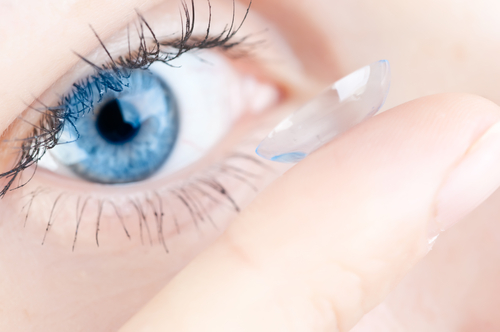Important tips for contact lens wearers
March 17, 2014

Are you one of the approximately 36 million Americans who wear contact lenses? Chances are that you went through a mini-course in proper hygiene with your eye doctor when you first obtained your prescription, but if you're being completely honest, any typical morning might involve waking up, getting dressed, brushing your teeth, throwing in your contact lenses and quickly drinking some coffee before heading out the door to greet the day. That all-too-quick minute used to put in your contact lenses may seem as insignificant and routine as choosing a travel mug for your morning coffee, but think about it, those lenses you are hastily placing in your eyes are custom-fitted, doctor-prescribed medical devices that should be given a whole lot more consideration.
Avoid these common mistakes when it comes to wearing contact lenses and enjoy crisp, clear and healthy vision.
Never use water or your own saliva as "emergency" contact lens solution
If you're out and about and find that your contact lenses are bothering you, but you don't have any contact lens solution readily available, you should never use water or your own saliva as a substitute. Saliva is ridden with bacteria that belongs in your mouth and not in your eye. Water also contains bacteria that should not make contact with your eyes. If you find yourself in a situation where your contact lenses are bothering you, use lubricating drops made especially for contact lens wearers, not drops that are used to combat red eye, to try and relieve your discomfort.
Do not allow tap water to come in contact with your lenses
Tap water does not have the same salty properties as tears and if it comes in contact with your lenses they will absorb the water and swell. IF you contact lens swells, it changes how the lens fits your eye and will make the lens tighten on your eye. This can create microscopic breaks in your cornea that microorganisms can get in to, potentially causing an infection. That's why it is important to never shower or swim with your contact lenses in.
Put your contact lenses in before applying makeup
To avoid getting makeup on your contact lenses, put them in before applying your makeup and conversely, be sure to take them out when you are removing makeup.
Avoid waterproof makeup
If waterproof makeup gets on your contact lens it will bind to it. Since waterproof makeup requires an oil-based remover, it will grease up the eyes and the lenses.
Swap out your old contact lens cases every three months
If you've been using the same contact lens case for as long as you can remember, that that old case out immediately. Contact lens cases should not be used for more than three months. If you're been storing your lenses in the same case for more than three months, you should swap the container out for a new one immediately.
Do not wear your daily or monthly contact lenses longer than recommended
If you're wearing your daily lenses for more than a day or your monthly lenses for more than a month you should stop. Your contact lenses are made of plastic, but they actually have pores to help keep them moist while in your eyes. These pores can get dirty and trap debris and dirt in the lenses, and if you use your contacts for longer than recommended, you run a serious risk of eye irritation, dry eye or infection.
Never sleep with your contact lenses in
Sleeping with your contact lenses in severely limits oxygen transmission. When you're awake, your cornea receives oxygen from the air and from your natural tears, but when you are asleep, the cornea receives less nourishment, lubrication and oxygen because your eyes are closed and are not blinking. Therefore when you leave your contact lenses in overnight, you're further depriving your cornea of oxygen. This can lead to your lens tightening in your eye causing microscopic rips to the cornea, and if for some reason there is a microorganism in your eye, it can then enter through that rip in the cornea and lead to an infection. Some contact lenses have been approved by the FDA for overnight and extended wear, but you should always consult with your doctor in order to obtain such prescription lenses.



